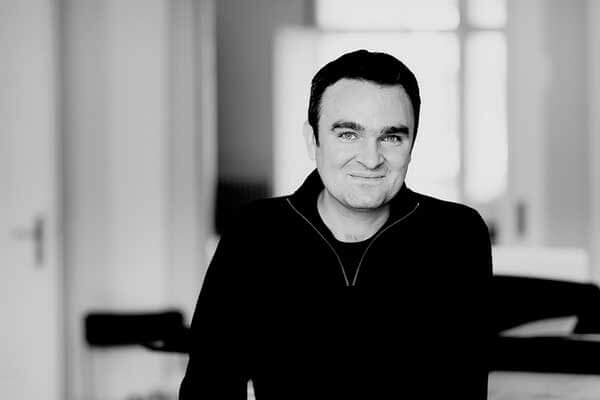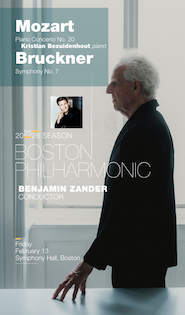BSO’s Widmann premiere bridges Leipzig’s musical past and present

Jörg Widmann’s “Partita” was given its U.S. premiere Thursday night by Andris Nelsons and the Boston Symphony Orchestra. Photo: Marco Borggreve
The current alliance between the Boston Symphony and Leipzig Gewandhaus Orchestras has already brought exciting new works into the world. Last month, as part of Leipzig Week in Boston, Andris Nelsons led the BSO in the world premiere of Sean Shepherd’s Express Abstractionism, an attractive and colorful musical canvas that was commissioned by both ensembles.
Thursday night, Symphony Hall witnessed another contemplative work as Nelsons conducted the American premiere of Jörg Widmann’s Partita, a BSO-Gewandhaus commission celebrating the partnership between the two ensembles.
Widmann’s star is ascendant as of late, and given his deep and profound sound worlds it is easy to see why. In fall of 2016, Nelsons introduced Boston audiences to Widmann’s Trauermarsch, a dark, brooding affair for piano and orchestra.
Like that score, Partita is bathed in mystery. The five movements recall the music and styles of two of Leipzig’s most famous musical citizens: Bach and Mendelssohn. Quotations of their works are woven into dense tapestries, and strains of the second movement from Mendelssohn’s Clarinet Sonata and hints of Bach’s “Badinerie” and themes from the Brandenburg Concertos crop up to remind listeners, in an Ivesian manner, of the wonders of the city’s musical history.
But Widmann wraps these elements in a subtle yet thorny texture all his own. Familiar melodies are set against grinding basses, shimmering celeste figures, and piercing whistle tones in the violins. Such colors drive this 35-minute work ever forward, and Widmann’s music continuously entices the ear with its unique sound.
Nelsons, who led the world premiere of Partita in Leipzig earlier this month, has a fine feel for the score. Throughout, the conductor led with a keen sense of the musical line. Phrases rose and fell like breath, and instrumental colors flowed smoothly from one passage to another. Gleaming trumpet figures and a glistening concluding chord supplied a touch of light to make this performance, and this work, stand out as one of the best of the current season.
The second half of the program was dedicated to Richard Strauss’s Don Quixote, which spotlighted cellist Yo-Yo Ma and BSO principal violist Steven Ansell as soloists.
Both musicians brought avuncular warmth for Strauss’s depiction of Cervantes’ memorable characters. As the Don, Ma played with deep, rosy tone. When the knight dreamt of his beloved Dulcinea, Ma’s sound swelled with intensity, as if a man caught up in the moment. Ansell’s viola brought out the chattering and galumphing side of the Don’s sidekick, Sancho Panza. Together, both musicians found a chamber-like intimacy in their shared passages in a true conversation among friends.
The music of Strauss is a specialty for Nelsons, and details were aplenty. Bleating sheep, handled by the flutter-tonguing brass, and cooing flute and oboe melodies cast a pastoral glow. When the Don encountered the Knight of the White Moon, Nelsons drew powerful stacked harmonies from the orchestra to signal the end for the knight errant.
Nelsons’ tempos were fluid and his phrases beautifully sculpted, an approach that was most affecting in Don Quixote’s death scene. In Nelsons’ and Ma’s hands, the music sounded with poignant melancholy to bring the Don’s life and adventurous journeys to a peaceful end.
The concert opened with Mozart’s Symphony No. 23. Though not one of the composer’s more familiar works, the short symphony possesses a roiling energy, especially in its outer sections. Nelsons delivered a robust performance. His quick lunges brought out sudden crescendos, and the orchestra found a dance-like grace in the final movement. Most beautiful was the central movement, where a solo oboe melody hung over the string passages like a weeping willow. Such elements made this little-played work of Mozart’s something to relish.
________
After the concert, the orchestra paid tribute to three members who will be retiring later this year. French hornist Jonathan Menkis, a member of the BSO for 34 years, and bassist James Orleans, who has played with the orchestra for 35 years, will leave their posts after the orchestra’s European tour this September. 39-year BSO veteran and violinist Nancy Bracken will step down following the Tanglewood season this summer.
The program will be repeated 1:30 p.m. Friday and 8 p.m. Saturday and Tuesday at Symphony Hall. bso.org; 888-266-1200
Posted in Performances




